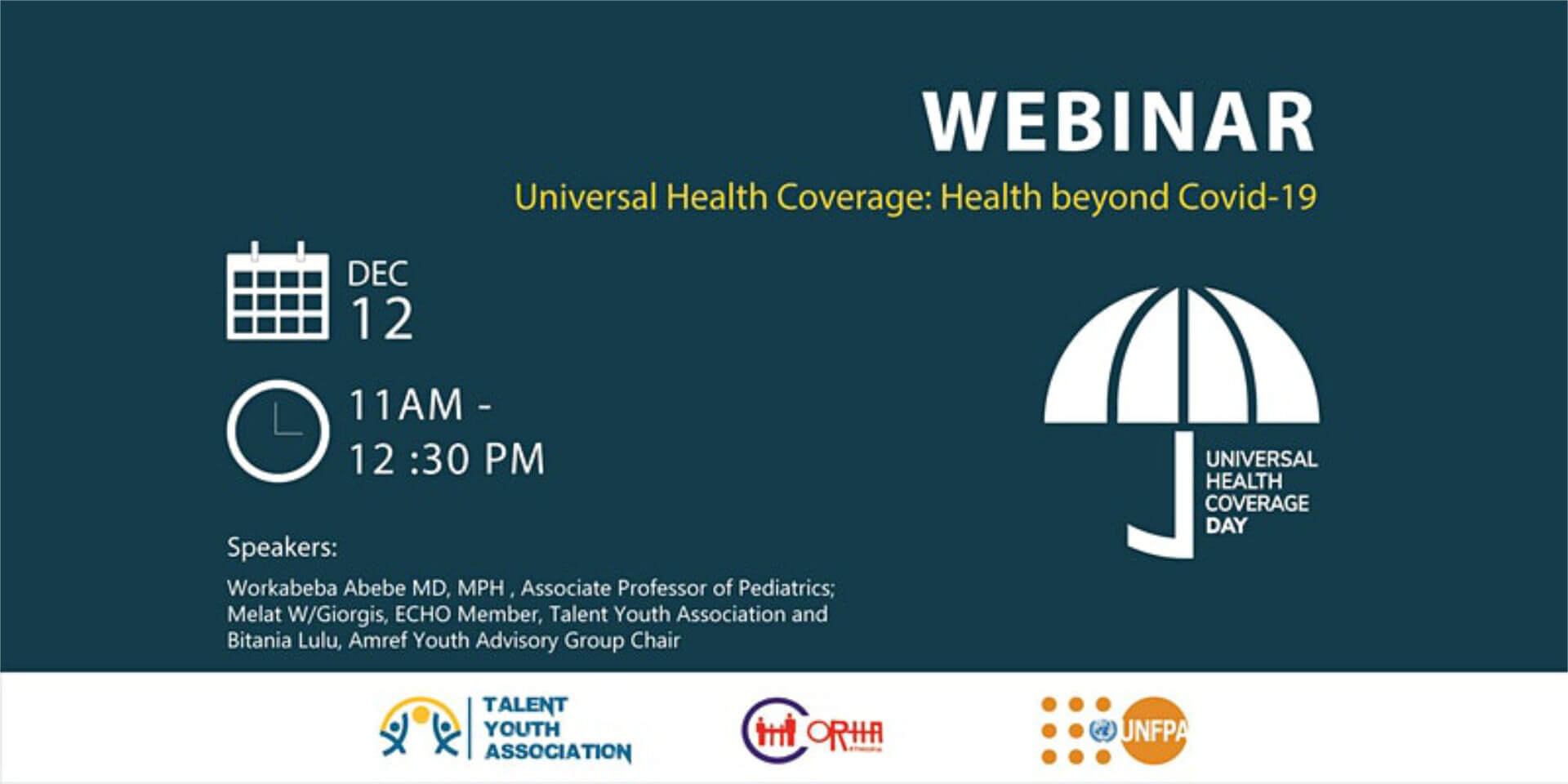
UNIVERSAL HEALTH COVERAGE:
Acceding to Universal Health Coverage beyond COVID 19
BY: Eyob Asfaw
The entrance of Coronavirus as public emergency and a pandemic has overshadowed the concern for universal health coverage. No one reminds easily as pandemic came in and out but yet posed to the everlasting quest for universal health coverage (UHC). Imperatively enough, one can simply pose the benefit of doubt as to why the international community in general and the WHO in particular engages on “Universal Health Coverage-UHC”.
For long, in the aftermath of the World War II, embraced maintenance of health as a typical component of its well cherished aspiration dubbed as ‘collective security’. Undoubtedly, the point of having peaceful and prosperous world for the advancement of humanity, necessitated far beyond ending war and placing economic solidarity and promotion of democratic peace. It is quintessential for the world to focus also on the need to “the attainment by all peoples of the highest possible level of health”. To the relief of the international community, attainment by all peoples of the highest possible level of health is also aspired within the core objective of the WHO.
Against the abovementioned background, On December 12, 2020 Talent Youth Association (TaYA) in collaboration with CORHA and UNFPA Ethiopia country office hosted a webinar to commemorate the universal health coverage showcasing the moderator- Elezer Berhanu and the panelists- Workabeba Abebe (MD), Bitanya Lulu, Samuel Zemenfeskidus(MD) and Rekik Ketema . Throughout the discussion, Workeabeba Abebe (MD) deliberated on the very rare talk on universal health coverage which exposed the backlog promises and unfulfilled job of the entire health care system. To one’s surprise the fixation on containing the spread on the Coronavirus pandemic disregarded to treat the initial UHC. It is not uncommon in which the world recessed down for gradual inability of paying the price even for the previously affordable medical services and vaccines.
The Agenda 2030 Sustainable Development Goal three termed universal health coverage as “Goal Ensure healthy lives and promote wellbeing for all at all ages”. Pundits argued that prior to the world switched to Universal Health Coverage from the previous primary health care system. As a result, there is increased interest from countries to transform their primary health-care systems towards broad based UHC. However, the aspiration to UHC will be realized only if there is a political commitment that will be translated into three interrelated and synergistic pillars of primary health care: (i) universal access to quality health services (supported by essential public health functions) and equity of access to health care; (ii) empowered people and communities; and (iii) multispectral policy and action for health. In this milieu, Workabeba (MD) reiterated the components of SDG3 which are (a) affordable and accessible health care (b) effective, safe and affordable medicine (c) vaccine for all.
By way of empowering the community, the government designed ‘Community health insurance scheme’ began to be implemented yet poor peoples are unable to pay the least premium demanded the government to cover their premium also. Arguably, the former deputy head of Addis Abeba Bureau of Health. Samuel (MD) contended that the premium of 350 ETB to 500 ETB per family for annum which is the lowest rate in comparison with other countries. Against this backdrop, various NGOs and beneficiaries of Safety Net Programs of other stakeholders implemented a program to cover premium of health insurance for the extreme poor population. Perhaps, the scheme of health insurance is not yet to pay costly health expenses, such as Dialysis and Chemotherapy.
In a local assessment, despite the overall promises in health services delivery, Ethiopia still falls short of UHC. In 2019 the UHC service coverage index was still very low at 39%. By virtue of its inherent characteristics, the index is based on tracer interventions for reproductive, maternal, newborn and child health, infectious diseases, and non-communicable diseases. There are still concerns, however, about the feasibility and effectiveness of the primary health-care approach towards UHC in low-resource countries. Moreover, there is inadequate evidence on the policy and practice of primary health care and UHC throughout the country.
In sum, the outbreak of the coronavirus pandemic posed both challenges and opportunities for the aspiration of ‘universal health for all’. The world can optimize the opportunity uncovered through the pandemic through revising health policies and practices once the pandemic diagnosed its hidden deficiency from meeting universal health for all. As a short communication, the author of this article gives a weekly food for thought as follows; if the coronavirus is not terminated by soon as a threat to international health then we all have to reorient our dilemma so as not to rob the sufficient attention reserved for universal health for all.
